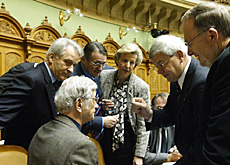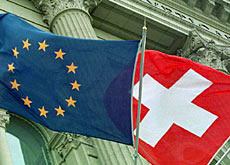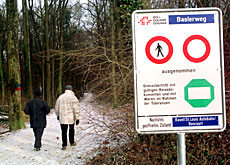Parliament signs off on bilaterals

The Swiss parliament has endorsed closer ties between Switzerland and the European Union.
But rightwing parties have launched campaigns against closer cooperation on security and asylum as well as on opening access to the Swiss labour market.
On Friday both houses of parliament signed off on the second set of bilateral accords between Bern and Brussels and on the extension of an existing treaty governing the free movement of people.
Almut Bonhage of the European Movement Switzerland said the debate during the three-week winter session had brought no surprises.
“We heard no substantially new arguments,” Bonhage told swissinfo.
The People’s Party also came in for criticism because of its staunch opposition to the treaties.
“The People’s Party refuses to help find a solution for an issue that is of key importance for Switzerland,” the group said in a statement.
Short debate
People’s Party parliamentarian Luzi Stamm regrets that the debates focused mainly on the Schengen/Dublin accords governing closer cooperation on security and asylum and on extending access to Switzerland’s labour market.
“There was little discussion about all the other treaties, and our compromise plan to delay implementation of the free movement of people for several years was rejected,” said Stamm.
However, he added that he was pleased that the People’s Party had received the support of a number of parliamentarians from other parties.
At the end of the parliamentary session on Friday, the People’s Party confirmed that it would force a nationwide vote on the Schengen/Dublin agreements.
The party argues that the accords are a threat to Switzerland’s sovereignty and will lead to an influx of foreign criminals.
Another party, the far-right Swiss Democrats, will mount a separate ballot-box challenge to the protocol on access to the Swiss labour market.
They are concerned that unemployment in Switzerland will increase if citizens from the ten new EU member states are granted access to the job market.
Collecting signatures
Stamm said the People’s Party would decide next month whether to support the Swiss Democrats.
The isolationist Campaign for an Independent and Neutral Switzerland supports both referendums.
For its part, the Swiss Federation of Trade Unions is widely expected to withdraw its referendum threat after parliament agreed on a series of measures aimed at preventing a drop in salaries.
The European Movement Switzerland has called for “sober campaigning”.
“We hope that the outcome of the ballot will be in the best interest of the country. This vote is not about whether Switzerland should join the EU,” said Bonhage.
The cabinet has still to decide whether the votes will be held on one day or whether they will be spread between June and another date later in the year.
swissinfo, Urs Geiser
At least 50,000 signatures are needed to force a nationwide vote on a parliamentary decision.
The signatures have to be collected within 100 days after the publication of the decision in the official government gazette.
The first vote is likely to be held next June, while another may be scheduled for later in the year.

In compliance with the JTI standards
More: SWI swissinfo.ch certified by the Journalism Trust Initiative




You can find an overview of ongoing debates with our journalists here . Please join us!
If you want to start a conversation about a topic raised in this article or want to report factual errors, email us at english@swissinfo.ch.